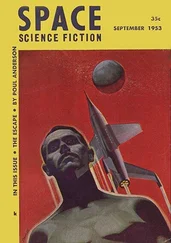Or is this too bold? Husband Paul becoming irked. Scenting out and reacting badly. Perhaps go slower; take gift to him , to his office? Give much the same story, but to him. Then let him give gift to her; no suspicion. And, Robert Childan thought, then I give Betty a call on the phone tomorrow or next day to get her reaction.
Even more airtight!
When Frank Frink saw his business partner coming back up the sidewalk he could tell that it had not gone well.
“What happened?” he said, taking the wicker hamper from Ed and putting it in the truck. “Jesus Christ, you were gone an hour and a half. It took him that long to say no?”
Ed said, “He didn’t say no.” He looked tired. He got into the truck and sat.
“What’d he say, then?” Opening the hamper, Frink saw that a good many of the pieces were gone. Many of their best. “He took a lot. What’s the matter, then?”
“Consignment,” Ed said.
“You let him?” He could not believe it. “We talked it over—”
“I don’t know how come.”
“Christ,” Frink said.
“I’m sorry. He acted like he was going to buy it. He picked a lot out. I thought he was buying.”
They sat together silently in the truck for a long time.
It had been a terrible two weeks for Mr. Baynes. From his hotel room he had called the Trade Mission every day at noon to ask if the old gentleman had put in an appearance. The answer had been an unvarying no. Mr. Tagomi’s voice had become colder and more formal each day. As Mr. Baynes prepared to make his sixteenth call, he thought, Sooner or later they’ll tell me that Mr. Tagomi is out. That he isn’t accepting any more calls from me. And that will be that.
What has happened? Where is Mr. Yatabe?
He had a fairly good idea. The death of Martin Bormann had caused immediate consternation in Tokyo. Mr. Yatabe no doubt had been en route to San Francisco, a day or so offshore, when new instructions had reached him. Return to the Home Islands for further consultation.
Bad luck, Mr. Baynes realized. Possibly even fatal.
But he had to remain where he was, in San Francisco. Still trying to arrange the meeting for which he had come. Forty-five minutes by Lufthansa rocket from Berlin, and now this. A weird time in which we are alive. We can travel anywhere we want, even to other planets. And for what? To sit day after day, declining in morale and hope. Falling into an interminable ennui. And meanwhile, the others are busy. They are not sitting helplessly waiting.
Mr. Baynes unfolded the midday edition of the Nippon Times and once more read the headlines.
DR. GOEBBELS NAMED REICHS CHANCELLOR
Surprise solution to leadership problem by Partei Committee. Radio speech viewed decisive. Berlin crowds cheer. Statement expected. Göring may be named Police Chief over Heydrich.
He reread the entire article. And then he put the paper once more away, took the phone, and gave the Trade Mission number.
“This is Mr. Baynes. May I have Mr. Tagomi?”
“A moment, sir.”
A very long moment.
“Mr. Tagomi here.”
Mr. Baynes took a deep breath and said, “Forgive this situation depressing to us both, sir—”
“Ah. Mr. Baynes.”
“Your hospitality to me sir, could not be exceeded. Someday I know you will have understanding of the reasons which cause me to defer our conference until the old gentleman—”
“Regretfully, he has not arrived.”
Mr. Baynes shut his eyes. “I thought maybe since yesterday—”
“Afraid not, sir.” The barest politeness. “If you will excuse me, Mr. Baynes. Pressing business.”
“Good day, sir.”
The phone clicked. Today Mr. Tagomi had rung off without even saying good-bye. Mr. Baynes slowly hung the receiver.
I must take action. Can wait no longer.
It had been made very clear to him by his superiors that he was not to contact the Abwehr under any circumstances. He was simply to wait until he had managed to make connections with the Japanese military representative; he was to confer with the Japanese, and then he was to return to Berlin. But no one had forseen that Bormann would die at this particular moment. Therefore the orders had to be superseded. By more practical advice. His own, in this case, since there was no one else to consult.
In the PSA at least ten Abwehr persons were at work, but some of them—and possibly all—were known to the local SD and its competent senior regional chief, Bruno Kreuz vom Meere. Years ago he had met Bruno briefly at a Partei gathering. The man had had a certain infamous prestige in Police circles, inasmuch as it had been he, in 1943, who had uncovered the British-Czech plot on Reinhard Heydrich’s life, and therefore who might be said to have saved the Hangman from assassination. In any case, Bruno Kreuz vom Meere was already then ascending in authority within the SD. He was not a mere police bureaucrat.
He was, in fact, a rather dangerous man.
There was even a possibility that even with all the precautions taken, both on the part of the Abwehr in Berlin and the Tokkoka in Tokyo, the SD had learned of this attempted meeting in San Francisco in the offices of the Ranking Trade Mission. However, this was after all Japanese-administered land. The SD had no official authority to interfere. It could see to it that the German principal—himself in this case—was arrested as soon as he set foot again on Reich territory; but it could hardly take action against the Japanese principal, or against the existence of the meeting itself.
At least, so he hoped.
Was there any possibility that the SD had managed to detain the old Japanese gentleman somewhere along the route? It was a long way from Tokyo to San Francisco, especially for a person so elderly and frail that he could not attempt air travel.
What I must do, Mr. Baynes knew, is find out from those above me whether Mr. Yatabe is still coming. They would know. If the SD had intercepted him or if the Tokyo Government has recalled him—they would know that.
And if they have managed to get to the old gentleman, he realized, they certainly are going to get to me.
Yet the situation even in those circumstances was not hopeless. An idea had come to Mr. Baynes as he waited day after day alone in his room at the Abhirati Hotel.
It would be better to give my information to Mr. Tagomi than to return to Berlin empty-handed. At least that way there would be a chance, even if it is rather slight, that ultimately the proper people will be informed. But Mr. Tagomi could only listen; that was the fault in his idea. At best, he could hear, commit to memory, and as soon as possible take a business trip back to the Home Islands. Whereas Mr. Yatabe stood at policy level. He could both hear and speak.
Still, it was better than nothing. The time was growing too short. To begin all over, to arrange painstakingly, cautiously, over a period of months once again the delicate contact between a faction in Germany and a faction in Japan…
It certainly would surprise Mr. Tagomi, he thought acidly. To suddenly find knowledge of that kind resting on his shoulders. A long way from facts about injection molds…
Possibly he might have a nervous breakdown. Either blurt out the information to someone around him, or withdraw; pretend, even to himself, that he had not heard it. Simply refuse to believe me. Rise to his feet, bow and excuse himself from the room, the moment I begin.
Indiscreet. He could regard it that way. He is not supposed to hear such matters.
So easy, Mr. Baynes thought. The way out is so immediate, so available, to him. He thought, I wish it was for me.
And yet in the final anaylsis it is not possible even for Mr. Tagomi. We are no different. He can close his ears to the news as it comes from me, comes in the form of words. But later. When it is not a matter of words. If I can make that clear to him now. Or to whomever I finally speak.
Читать дальше










